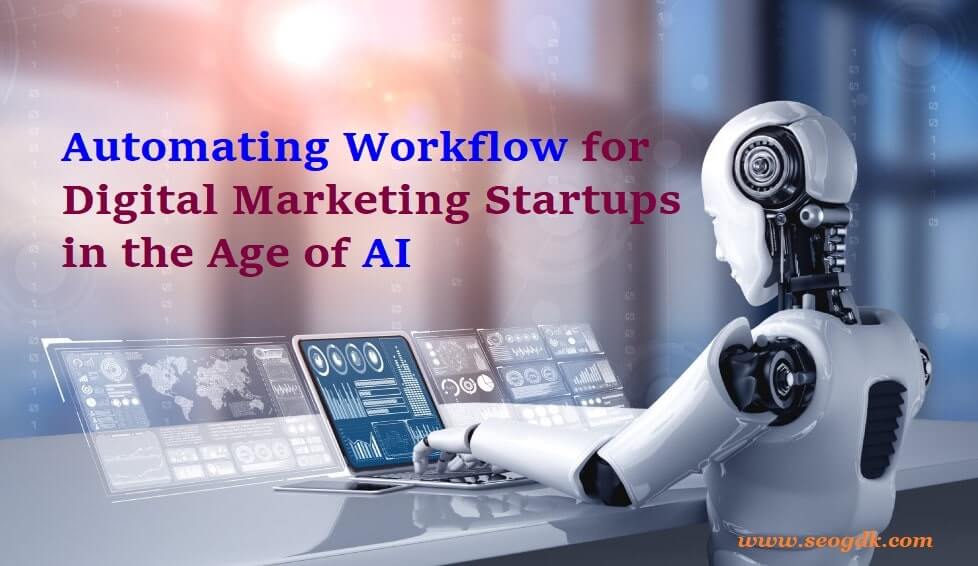How to Improve the Efficiency of Digital Marketing Startups Using Automation Tools?

Strong 8k brings an ultra-HD IPTV experience to your living room and your pocket.
In today’s rapidly evolving digital landscape, startups in the field of digital marketing face a unique set of challenges and opportunities. The age of Artificial Intelligence (AI) has ushered in a new era of possibilities, where automation has become the linchpin of success.
As digital marketing professionals strive to navigate this dynamic environment, the need for streamlining and optimizing workflows has never been more critical. In this guide, we will delve into the world of automating workflows for digital marketing startups, demystifying the complex jargon and providing practical insights that every entrepreneur and professional can grasp effortlessly.
By the end of this journey, you will not only understand the fundamental concepts but also be well-equipped to harness the power of AI to supercharge your digital marketing operations. Welcome to the future of digital marketing automation, where efficiency and innovation collide to propel your startup to new heights.
What is AI Workflow Automation?
AI workflow automation is the process of utilizing artificial intelligence technologies to streamline and optimize the sequence of tasks, decisions, and actions within a specific business process or workflow to reduce manual intervention, enhance efficiency, and improve overall productivity.
It involves the use of machine learning algorithms, natural language processing, and other AI-driven techniques to handle routine or complex tasks automatically, make data-driven decisions, and adapt to changing circumstances, allowing organizations to allocate their resources more strategically and focus on higher-value activities.
Factors to Evaluate When Selecting Digital Marketing Automation
When selecting your digital marketing automation solution, it is essential to consider different factors to ensure the right fit for your specific needs. Here are some crucial considerations:
§ Overview of the Digital Marketing Landscape
Before selecting any automation tools, it is crucial to understand the evolving digital marketing landscape. Stay updated on the latest trends, platforms, and consumer behavior.
§ Business Process Management
Evaluate how the automation solution aligns with your business processes. Consider whether it streamlines your workflow, integrates with your project management tool, and enhances overall efficiency.
§ Integration with Project Management Tools
Seamless integration with project management tools is crucial. It ensures that marketing campaigns and projects are well-coordinated and executed efficiently.
§ CRM Automation Software
Assess the compatibility of the automation solution with your Customer Relationship Management (CRM) system. Integration with CRM automation software can help in managing leads, customer data, and personalized marketing efforts.
§ Marketing Automation Tool
Evaluate the core marketing automation capabilities of the software, such as email marketing, lead nurturing, and campaign tracking. Ensure it can help you reach your target audience effectively.
§ Sales Automation
If sales are a significant part of your marketing strategy, look for sales automation tools that aid in lead management, sales pipeline tracking, and conversion optimization.
§ Project Management Software
Apart from project management tools, consider project management software if it offers features like task scheduling, collaboration, and resource allocation to enhance campaign execution.
§ Digital Workplace
Evaluate whether the automation software can contribute to creating a digital workplace that fosters collaboration, communication, and centralized access to marketing assets.
§ Data Analytics and Reporting
Check if the automation solution provides robust data analytics and reporting features. It is essential for measuring ROI and optimizing marketing strategies.
§ Scalability
Ensure the chosen automation tool can grow with your startup. It should be scalable to accommodate your expanding marketing needs and adapt to future technologies.
§ Ease of Use and Training
Consider the learning curve and training required for your team to use the software effectively. An intuitive interface can save time and resources.
§ Customization and Personalization
Customization is crucial for tailoring your marketing campaigns. Look for tools that allow you to personalize content and messages for various customer segments.
§ Compliance and Security
Ensure the software complies with data protection regulations and offers robust security features to protect sensitive customer data.
§ Cost and ROI
Analyze the total cost of ownership, including subscription fees and implementation costs. Consider the potential return on investment (ROI) when choosing an automation tool.
§ Support and Training
Assess the availability of customer support and training resources. Having a responsive support team can be valuable when issues arise.
§ Future-Proofing
Look for adaptable solutions that can accommodate future advancements in marketing technology, such as AI and machine learning.
§ User Feedback and Reviews
Research user reviews and seek feedback from peers in the digital marketing community. Real-world experiences can provide insights into the effectiveness of the tool.
By considering these factors, you can make an informed decision when selecting your digital marketing automation tools, ensuring they align with your project management needs and contribute to your startup’s success in the competitive digital marketing landscape.
The Impact of Generative AI Tools on Workspaces
Generative AI tools are ushering in a transformation in the workplace. These innovative technologies, like chatbots, language models, and automation software, streamline tasks, enhancing creativity and boosting productivity. They assist in automating repetitive jobs, aiding in content generation, and providing quick solutions to routine queries.
As a result, employees can focus on more strategic and creative aspects of their work, leading to a more efficient and dynamic workplace. The influence of generative AI is not just about doing tasks faster but also about reimagining how work is accomplished in the digital age, making it more responsive to ever-evolving demands.
Advantages of Harnessing AI for Digital Marketing
Leveraging Artificial Intelligence (AI) in digital marketing offers numerous benefits. Here are some significant advantages:
§ Enhanced Personalization
AI enables highly tailored and individualized marketing campaigns by analyzing customer data and behavior. This personalization fosters better customer engagement and higher conversion rates.
§ Improved Efficiency
Automating repetitive tasks, such as email marketing, ad placement, and data analysis, increases operational efficiency. It allows your marketing team to focus on more strategic and creative aspects of their work.
§ Predictive Analytics
AI can forecast trends and customer behavior based on historical data. With the help of this predictive capacity, you can proactively modify your marketing plans and keep up with shifting consumer trends.
§ Real-time Data Analysis
AI processes vast amounts of data in real-time, providing you with immediate insights into customer interactions and market conditions. This agility allows for quicker decision-making and adaptation.
§ Cost Savings
By automating tasks, optimizing ad spend, and minimizing errors, AI can lead to significant cost savings in your digital marketing efforts. You can allocate your budget more effectively, achieving better results with the resources at hand.
§ Cross-Channel Marketing
AI helps unify data across various marketing channels, enabling you to create a seamless, consistent customer experience.
§ Fraud Detection and Prevention
AI algorithms can detect fraudulent activities in real-time, safeguarding your marketing investments.
Final Thoughts
Automating workflows in digital marketing startups during the AI era is no longer an option but a vital requirement. As AI technologies advance, integrating automation not only boosts efficiency but also empowers businesses to remain competitive and innovative.
Through the utilization of automation, startups can optimize resource allocation, achieve significant outcomes, and adeptly navigate the dynamic digital landscape, fostering confidence and success.
Note: IndiBlogHub features both user-submitted and editorial content. We do not verify third-party contributions. Read our Disclaimer and Privacy Policyfor details.


